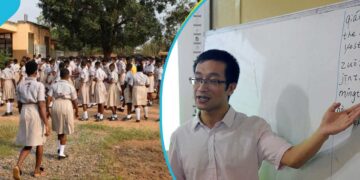Minister of Employment, Labour Relations and Pensions, Ignatius Baffour Awuah has called upon stakeholders to join forces by leveraging their collective resources and expertise to broaden the impact of interventions to curb child labour.
He says the issues of child labour have been longstanding and advocated for the blend of formal education and informal labour of Ghanaians in the employment sector to curb the menace of child labour.
Speaking at a World Child Labour Awareness Event in Accra, he indicated that one in five children in Africa representing19.6 per cent are child labourers compared to between three per cent and seven per cent prevalence in other regions of the world.
Mr Awuah said the statistics in Ghana have shown that nearly 28% of children aged 5 to 7 years are engaged in child labour with around 21% engaged under hazardous working conditions which is very concerning.
Mr. Baffour Awuah emphasized many African countries have ratified the conventions on forced labour, child labour and discrimination, with many proscribing child labour in all its forms.
To him, the solution to eradicating the rapid rise of child labour in Ghana lies in the drama exhibited by children today.
“The drama exhibited by the children has given me the solution. They said education is a must for children, but then at the same time, we should not also forget to introduce them to informal trading. So we need a combination of both, giving them the traditional education and at the same time, making sure that they get used to the informal trades that their parents find themselves in. That, to me, is the answer to our solution of child labour in Ghana.”
Mr. Baffour Awuah stressed that the banishment of domestic-level labour is not the ideal solution to eradicating child labour in Ghana.
To him, Ghana cannot adopt in total what others have prescribed as the solution for issues of child labour by banning everything that is done at the domestic level and classifying that as issues of child labour.
He is of the view that as technology and education have come to stay, the use of formal education to create innovative ways of easing the labour burden of parents in their domestic-level labour is the solution.
He also advised children to embrace their parent’s occupation and assist them in enforcing a formalized way of getting their work done especially in rural communities.
“We certainly will have to learn from our parents so that we do not lose track of where we are coming from and the traits that we are used to, but then we can use our formal education to even advance the course of what our parents have done informally,” he said.
Read also: CCCDF Inaugurated to Foster Development in Cape Coast
Source: Angelina Riley Hayford/ATLFMNEWS




























